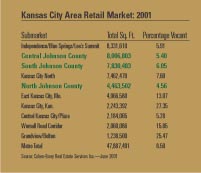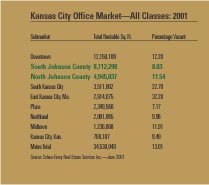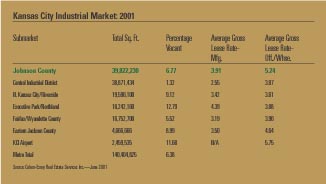The Retail Market
The success of Johnson County’s retail centers relies a great deal on
the county’s “pull factor,” according to the DRC (Development
& Retention Council of Northeast Johnson County). A pull factor above
1.00 indicates a community is attracting more retail business than it’s
losing. A pull factor below 1.00 indicates a community’s citizens are
spending their retail dollars elsewhere. Johnson County has a pull factor
of 1.56, the highest county in Kansas according to Kansas State University.
The county’s reputation as a retailer’s haven brings to the area
everyone from mom-and-pop stores to stand-alone big boxes to mall anchor tenants.
National tenants that have moved into the area in the last few years include
Lowe’s, Costco, and Nordstrom.
Three distinct retail submarkets can be identified within the county—north,
south and central. According to a 2001 survey done by Cohen-Esrey, all have
maintained low vacancy rates relative to the rest of the metropolitan area.
Particularly encouraging is the trend in more mature areas to redevelop older
properties for new tenants. Costco, for example, razed the Levitz Furniture
building at I-35 and 95th Street for its shiny new store. Target will replace
the Gerson Co. building at Shawnee Mission Parkway and Metcalf Avenue with
a new retail outlet. And from the 50th Terrace Plaza in Roeland Park to the
Walk at High Point in south Overland Park, plans for new retail centers are
on the drawing board.

The Office Market
The Kansas City metropolitan area truly has two Central Business Districts,
and Johnson County is one of them. No longer a collection of sleepy bedroom
communities, the county has turned itself into a net importer rather than
net exporter of workers, which led to a 42-percent increase in Class A office
space in the southern half of the county between 1998 and 2001. The total
of all office space—Class A, B and C—in North and South Johnson
County combined equals 13,657,335 square feet compared to downtown Kansas
City’s 12,158,109 square feet.
Vacancy rates in North and South Johnson County rose slightly from 2000 to
2001, as they have in many submarkets, but lease rates held steady. The typical
lease rate per square foot for Class A space was $19.72 in North Johnson County
and $23.64 in South Johnson County. While the market takes a breather in 2002,
new construction most likely will be restricted to single-tenant build-to-suit
projects or multitenant buildings with substantial preleasing.

The Industrial Market
In 2001, Johnson County had the largest concentration of industrial space
of any submarket in the Kansas City area, surpassing the Central Industrial
District by about one million square feet. From manufacturing to bulk distribution
to office-warehouse, the inventory of industrial space in the county fills
the needs of many users.
2001 saw the announcement of several projects that will have a positive impact
on Johnson County’s industrial plant. Federal Express Corp.’s sorting
and distribution hub in Shawnee underwent a $10 million expansion. The Gerson
Co., which is vacating the new Target site at Shawnee Mission Parkway and
Metcalf Avenue, will redevelop a property itself—the 250,000-square-foot
Aldi Food Warehouse in Olathe. And Lenexa, long the king of the industrial
market, has too many projects in the works to enumerate.
A real coup for the county, though, was the announcement in 2001 that Intervet
Inc., the U.S. subsidiary of Intervet, the world’s third-largest animal-health
company, had chosen a site in DeSoto, Kan., for a new facility. Located on
315 acres along the K-10 Corridor, the state-of-the-art campus will serve
as a regional administrative, manufacturing and R&D center. A total of
215,000 square feet will be constructed with an estimated completion date
of 2004 and an estimated capital investment to the area of $37 million.

And More
No discussion of real estate development in Johnson County could be complete
without mentioning the new Overland Park Convention Center and adjoining Sheraton
Overland Park Hotel. With its 97,600 square feet of exhibit and meeting-room
space at the center and 412 rooms in the hotel, the project is one Johnson
Countians have been waiting for with anticipation. When the center opens in
December of 2002, it will solidify Johnson County’s position as Kansas
City’s second—but perhaps premier—Central Business District.